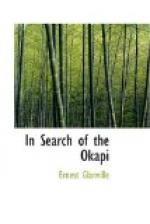When he had gone, the three plunged into the wood to follow the river down to the spot where the Okapi had been docked. After leaving many shreds and patches of clothing on the thorns, Mr. Hume and Venning discovered the spot by the “blaze” on the trees adjoining made by the axe. If it had not been for those signs, they would not have recognized the place, for they had expected to find a clearing, and, instead, there was already a thicket of young shoots, which had sprouted from the buried saplings. Cutting away this growth, they soon removed the soft mould and the covering of branches. Then they cut a way down to the river, and ran the Okapi out into the water. The chains were greased, the deck riveted in position, the mast fixed, and the boat washed down. That done, Venning put into effect a scheme he had been turning over in his mind for a regular hot-air bath that would steam all the ague, rheumatism, and fever out of them.
“What we must do,” Mr. Hume was always insisting, “is to keep the circulation active.”
“We’re going to have a Turkish bath,” said Venning, firmly—“a real one—one that will clear all the germs put at a run, and remove this continual singing in the ears.”
“Does your head sing?” asked Compton, pressing his forehead. “My brain seems to be on the shake as if it were jelly.”
“That’s the feeling,” said Venning; “and I’ve got a notion. See the well? Good; that’s to be our hot-air bath. We’ll rig the oil-sheets over it by means of a couple of bent saplings. We’ll put the lamp inside, bank loam around it, moisten the loam with water, leave it until it steams, then pack one of us in. I’ll be the first, to show that it is safe.”
“Good,” said the hunter, gravely. “And when you have been steamed, we’ll knead you, wash you down with warm water, and shave your head.”
They did it. Venning went under the sheet; he went in nearly black, and very heavy in the head. He came out brown and white, with a feeling of lightness; and when he had been shaved, shampooed, thumped, whacked, and kneaded, he felt “pounds better.” Compton and Mr. Hume each underwent the hot-air cure, with the same good results; and then, clothed in clean underwear, and protected by a dose of quinine, they manned the levers, and went skimming along the river, glad to be back in their good boat.
“We must call for the old Arab,” said Compton, “now that we are bound for the Place of Rest.”
“He’ll be in the way,” growled Venning; “and we have no time to lose.”
“We will call for him,” said Mr. Hume. “If we miss Muata, the old chap could act as guide.”
So they put in where the tall palm grew, and while Venning guarded the boat, the other two went up the path to find the village. They found it in ruins, and on a post was the head of the old Arab with a lot of Arab writing.
Compton read it out. “Hassan has been. Those who are silent when they could talk remain silent for ever.”




